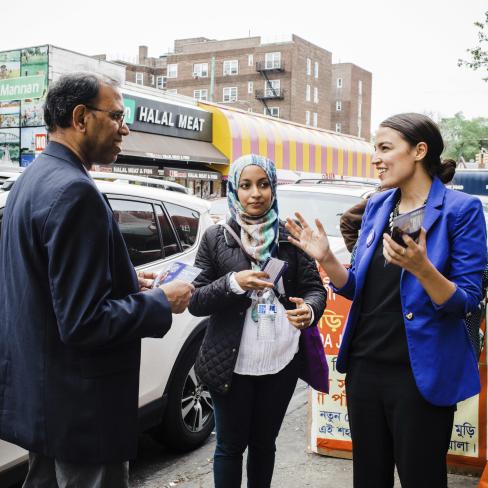
A new social revolution is happening in the United States of America. It is exciting, and I hope you notice. I hope you participate. This is history in the making.

In 2014, “I [still] have a dream.” (Yes, I know this is 2013. I’m talking about the year after…or the year after the year after…)
I have a dream that United States of America — its government and people — would reject the global politics of war. In the sixties, it was Vietnam. In the seventies, it was Bangladesh and Chile. In the eighties, it was Iran. In the nineties, it was Iraq. In 2003 and years after, it was Iraq and Afghanistan. Now, we’re ready to wage another war, this time on Syria.
I have a dream that the ordinary, hardworking men and women of America — black, white, brown, olive or yellow — would come together and live together in harmony, and know one another. New immigrants from China, Korea, India, Mexico, Guatemala and Haiti would be embraced by old immigrants from Italy, Germany, Russia, Israel and Ireland.
I have a dream that American government and media would teach our children history of the makers of our country: the millions of men and women who worked through centuries to build the farms and factories, roads and river dams, buildings and bridges, parks and libraries, schools and hospitals. History books would talk about not just the rich and famous and elite, but about the ninety-nine percent: the real heartbeat of America.
I have a dream that America would preach and practice exactly the same thing across the world, and not follow one set of standards for here and another everywhere else. American foreign policy would respect rights and freedom of people and places — equally — even for countries that do not like us or follow our lifestyles.
I have a dream that the rich-poor disparity in America would be brought back to the minimal we saw in the Golden Age of American Capitalism between 1940 and 1980 when the middle class was happy, peoples’ productivity and wages went up hand in hand, the American Dream of upward social mobility was a reality, and when organized labor movement was the strongest.
I have a dream that American mass media would withdraw from manufacturing consent in favor of the one percent ruling-class people in power, and deliver news based on honesty, balance and objectivity — for the mass.
I have a dream that we can show the promise of the Promised Land to our children — in our lifetime.
Amen.
An humble follower of Dr. King’s teaching,
Partha
Brooklyn, New York
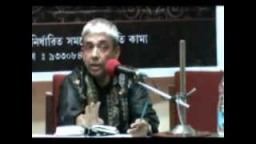
Frontal word is a phrase in my own little dictionary.
Over the years, I’ve created a number of words and phrases, and used them in my articles and blogs. Some of them have been nearly as meaningful as Orwell, Obamaspeak, Newspeak or New York Times. You can find them in my rabble, ramble and rubble.
Here’s a few examples out of my personal Thesaurus: (1) Flesh Dancing, (2) Synchronized Jump-laughing, (3) Journalism of Exclusion, (4) Undislike, (5) Wordorgasmilistics, and (6) Englishmatics. There are some more. Call me if you undislike them.

They’re like, Dr. Seuss. Or, Sukumar Ray. Weird, powerful, funny.
Frontal Word is much simpler. It means word to upfront. It means word to confront. Confront the past. Confront the present. Then, first confront and then upfront the future. It’s a word that finds its roots in old Latin, Hebrew, Arabic, Pali and Sanskrit…sorry…I mean…in old experience. My bad!
Old experience, then, is old memories. Lifelong memories. Sweet memories. Sour memories. Beautiful and bitter memories. Good memories, great memories. Frontal word upfronts and confronts life with use of these memories. Memories are good to memorize. And who doesn’t know Indians and Bengalis are good at memorizing? Just ask any Spelling Bee judge here in America!
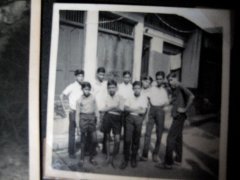
But seriously, now that I am suddenly one whole eon older at this important juncture of my life — one year older by the traditional definition of a birthday and one eon older because of the upfronting, confronting, alarming health situation with transient memory loss, confusion and all, people who love me and care for me — such as my family, friends, colleagues, doctors, Facebookers and blog readers — strongly advised that I wrote only about pleasant, personal moments of life.
They said it would be good to upfront and confront my life: with happy thoughts. They said why do I not write about some of the most pleasant, memorable, happy thoughts that make me smile even in my darkest, creepy nightmare? And you know what: I thought they were absolutely right! After all, I want to live a little more…through a few more happy experiences.
Don’t you?

So, taking advantage of this happy time — my birthday on the 25th of April — I write about some of my most pleasant memories. I wonder if you — my friends, colleagues and blog readers from various parts of the world — would be able to relate to all of those memories given the clothes they wear, looks they look, spirits they script, bricks they paint, foods they fodder, or drinks they fuel. But I do hope because the speaks they speak have some commonspeak as opposed to newspeak, and because in my upfrontal, confrontal personal dictionary, commonspeaks are first pages and newspeaks are appendices, some of you — the more caring, loving, empathizing and keeper-upper cheergivers — would manage to get at least the grist of it.
That is my hope. So, without further ado, I list a list (randomly un-ordered) to celebrate my birthday this year. Let me know if you need an expanded version. I shall provide. Just order it. I even have a half-finished memoir to circulate among my most ardent admirers.
The Randomly Unordered List
Memory 1. — I stood first in my class exam at Scottish Church School. My mother stood in the two foot by two foot mezzanine balcony to greet me when I walked back from school. I remember I was wearing a mischievous grin.
Memory 2. — I top scored in our school cricket match and won a nearly-lost game. Then my friends lifted me up on their shoulders and cheered: Hip Hip Hooray…(that was the only Scottish way of cheering we knew).
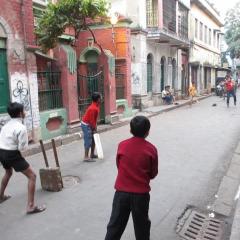
Memory 3. — Jumping forward. — Some of my students at a remote, rural college in South Bengal got distinction in their university exam. I was their first and only professor in biology and worked overtime to make sure they passed. We had no electricity. We used kerosene lanterns for extra evening classes I offered for free. I was twenty five at that time. It was my first job and my first experience to live away from home.
Memory 4. — Jumping backward. — At a handwriting competition at primary school, I got the first prize in Bengali script, beating my friend and arch-enemy Ananda. This kid wrote like calligraphy. I also got my first book as a prize: it was a famous Sukumar Ray book. Cherished it all my life. I still have it here in my little personal library in New York.
Memory 5. — Our first family train trip across North India. We went to Benaras, Lucknow and Bareilly. I was four, and believe me, I remember most of the trip. It was winter and Bareilly was unusually cold. Having raised in pleasant-weather Bengal, I never knew India could be so cold! My aunt’s family was quite well off (and poor Ma was totally in awe to see their riches); they had a big house, a garden with beautiful flowers, a swing where my sick mother would sit once in a while, and room heaters in every room. They even had a big European dog, and mother and I were both afraid of dogs, so they would keep him inside most of the time.
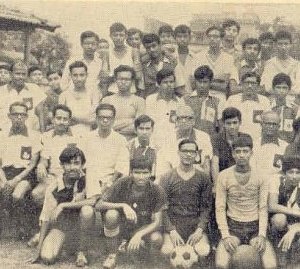
Memory 6. — Scored highest number of goals in neighborhood football (soccer) league two or three times in consecutive years. Even got prizes from our local city councilor or somebody important like him. Of course, we played with rubber ball: never had the money to buy a real football. But that was just okay. In fact, it was enormous fun.
Memory 7. — Got the best student scholarship for ranking top in class exams around the year. Mr. A. B. Roy, headmaster, would call me out of my class into his teaching room and gave me the scholarship in front of all the students. Oh, what a chest expander it was!
🙂
Memory 8. — Shift gear and move up a few more years, quickly. — I was making a half-hour speech at a political street-corner rally in the university area of Calcutta. Given how shy and introvert I was when I was a kid (not to say anything about my feminine voice that friends and elders mocked about), it was a remarkable achievement — let alone keeping the audience to actually listen to my ramble.
Memory 9. — Shift gear and fast forward a few more years. — I was teaching a full class of American students, this time in English. Believe me, it was not easy. I never spoke in English in my life. I came to America just a week ago, I was underfed, I was ten thousand miles away from my wife and family, I didn’t know a soul on the Western hemisphere, and I was shivering in my first Chicago wind chill.
Memory 10. — Shift gear again and move up a few more years, more quickly. — I was giving a major speech at a political rally on Wall Street, to protest the domestic repression after 9/11 and particularly to protest against the visit of Bush’s attorney general Ashcroft. New York Civil Liberties Union organized the rally with help from grassroots organizations such as ours. I was the post-9/11 community organizer working against hate crimes on immigrants. I do believe it was one of the most important speeches I’ve ever made in my life, and in English too!
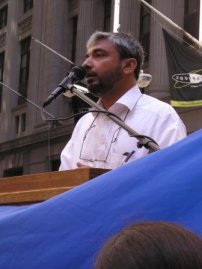
Memory 11. — Marriage at a rather young age just a few months after getting the college lecturer job. Just a couple of years later, I left the job and family and friends and India behind for a very uncertain future in the U.S. It was a bitter-sweet memory given the permanent departure from a place I loved so much. Yet, the adventure of jumping into a completely unknown side of life with just a few dollars in my pocket — to show to the rest of the world that even someone like I could do it, and that too, not to be rich but to be someone with extraordinary desire to do something different and exceptional in life — was absolutely, positively special. In retrospect, with all the pluses and minuses and joys and sorrows, I would do it again.
Memory 11(a). — Birth of a child. Unbelievable experience to hold the little bouquet of joy!!
Memory 12. — 2004. Getting first-page coverage in major American media including the New York Times of our immigrant rights and justice work. It happened a number of times over the years, and together with all my colleagues in the organizations I worked for, the recognition of our work and spreading the news across the country and world made it special. Very special, indeed!
Memory 13. — First book published in 1998. Ajanta Publishers in Delhi put out my autobiographical book on the RSS and BJP, Hindu fundamentalist organizations that I was once deeply involved in and went up the ladder fast. But I was definitely not a fundamentalist type, ever. I was with them for more than fifteen years mainly because my father took me there. At one point, I had to come out. So, I came out and wrote about my insider experience with the far right groups. It was not easy; the book made my father heartbroken. But for me, it was a major accomplishment: I grew up both politically and intellectually.
Memory 14. — In 2012, I recorded twenty songs of Rabindranath Tagore. It was my little contribution to the world of poetry and music lovers on the occasion of Tagore’s 150th birth anniversary. The total experience over the week of studio recording, first with the noted instrumentalists and then the voice recording for a few more days, was simply extraordinary, unforgettable.
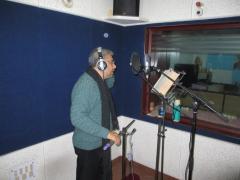
Memory 15. — Going back again, a whole bunch of years back to my adolescence, at my Holy Thread ceremony when I was fourteen years old, a few colleagues from my father’s factory Usha Sewing Machine Works gave me a beautiful gift: a small, Agfa box camera. It was one of my most cherished possessions. It stayed with me for many years until it disappeared into oblivion, just like many other beautiful, prized possessions I lost forever. But even though I lost the physical possession of it, I never lost the precious, beautiful memories I had with it. Nobody could take the memories away. Especially, that social ceremony left a permanent, pleasant impression on me forever.
Memory 16. — Rewinding one more time, my father threw a small, family party to celebrate my fifth birthday. I still remember, our mezzanine apartment in North Calcutta was decorated with colorful balloons. A whole bunch of friends and relatives came. My mother cooked some of her phenomenal dishes, just the same way she would cook for all my friends over the years for all my birthday parties. I remember many of my birthday celebrations in Calcutta — my special friends and my mother’s special food made them ever so special.
Memory 17. — I was stuck like glue to neighborhood Tagore birthday celebrations: legends such as Debabrata Biswas, Suchitra Mitra and Hemanta Mukherjee are singing the poet’s celestial songs — for hours. It was my first experience to be with God.
Going back a few more years, yes, going back to when I was two and a half perhaps, I would walk with my mother or aunt to our neighborhood pre-K school Shishu Niketan (which in Bengali means the house of the child), where I would learn how to sing Tagore, read the alphabet, do the elementary arithmetic, sew simple thread and needle, and play fun games a lot. The teachers would even put us to sleep in the dark and quiet sleep room for an hour or so in the middle of the day. I even had my own stitch-cloth comforter which my mother sewed my name on — a cuddly, soft comforter my sister used when she went to the same school about eight or nine years later. I was in middle school by that time; I’d drop her off at ten, go to Scottish Church, and pick her up at four in the afternoon on my walk back from school.
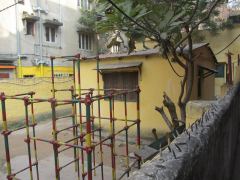
Pleasant memories…so many…so many of them! It would take a lifetime to talk about only a fragment of it. I only managed to tell a few stories, and left the many others for later. There are so many beautiful stories I want to tell you. Only if you have time for me.
But for now, it makes me so happy to remember some. I hope they made you a little happy too.
Thanks for staying with me. Thanks for smiling together with me.
Did I upfront too much? I hope not.
🙂
Sincerely, Happily Yours,
Partha
Brooklyn, New York
###
